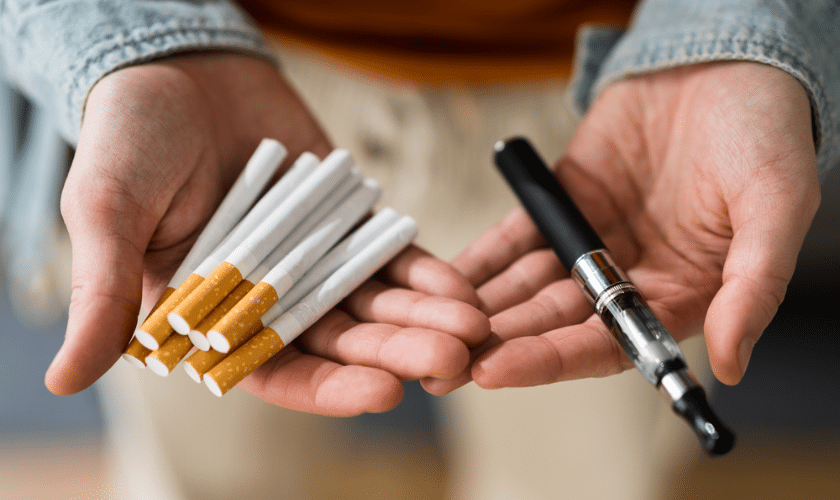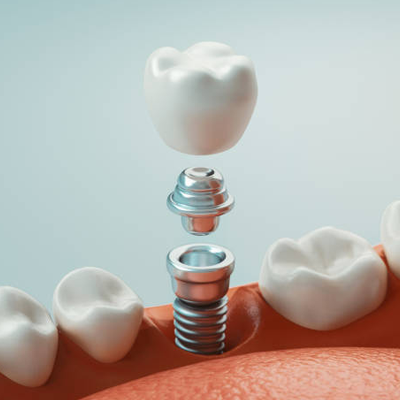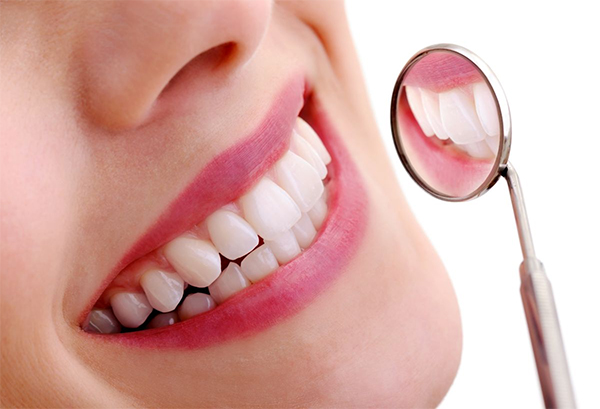
For decades, cigarettes have been notorious for their harmful effects on overall health, including the devastating impact on your smile. However, the rise of vaping has introduced a new player in the game, leaving many confused about which habit poses a greater threat to oral health. While both smoking and vaping share detrimental consequences, understanding the nuances of each is crucial to making informed choices. This blog delves into the world of smoking and vaping, unveiling the truth behind the puffs and their impact on your pearly whites.
How Smoking Wreaks Havoc on Your Smile
Cigarettes harbor a toxic cocktail of over 7,000 chemicals, many of them confirmed carcinogens and potent toxins. These insidious substances wreak havoc on your oral health, unleashing a cascade of problems that can significantly compromise your smile and overall well-being. Here’s how smoking affects your oral health:
From Pearly Whites to Stained Frights
The tar and nicotine in cigarettes are notorious for their staining prowess, leaving behind unsightly yellowing and brown discoloration on your teeth. This gradual erosion of your once-pearly whites can be stubborn and difficult to remove. However, even with professional cleaning, it leaves a lasting reminder of the habit’s harmful effects.
Gum Disease: A Slow and Silent Destroyer
Smoking significantly increases your risk of developing gum disease, also known as periodontal disease. This inflammatory condition silently attacks the tissues and bones that support your teeth, leading to their gradual weakening and potential loss if left untreated. The pain, discomfort, and potential tooth loss associated with gum disease can significantly impact your oral health and overall quality of life.
A Shadow Lurking: The Increased Risk of Oral Cancer
Smoking is a major culprit in the development of oral cancer, which can affect various parts of your mouth, including the lips, tongue, cheeks, gums, and throat. This devastating disease highlights the crucial role of early detection in successful treatment. Regular dental checkups become even more important for smokers, as they allow for the timely identification of any potential issues.
Healing on Hold: The Roadblock to Recovery
Smoking impairs blood flow and hinders the body’s natural healing abilities. This can lead to post-operative complications following dental procedures like tooth extractions or gum surgery. The compromised healing process can extend recovery times, increase discomfort, and potentially compromise the success of the procedures.
A Breathtakingly Bad Impression: Persistent Bad Breath
The unpleasant combination of tar, nicotine, and the breakdown of oral tissues by bacteria contributes to persistent bad breath, also known as halitosis. This can significantly impact your social interactions and self-confidence, adding another layer to the negative consequences of smoking.
Vaping: A Cloud of Uncertainty? Exploring the Potential Risks
While often perceived as a “healthier” alternative to smoking, vaping is not without its risks. Although research on the long-term effects of vaping is still ongoing, here’s what we know so far:
Limited Evidence: Unlike smoking, which has decades of research documenting its harmful effects, vaping is a relatively new phenomenon. This lack of long-term data makes it difficult to definitively assess its full impact on health, including oral health.
Nicotine’s Negative Influence: Regardless of the delivery method, nicotine itself has detrimental effects on oral health. It constricts blood vessels, hindering the flow of oxygen and nutrients to the gums. As a result, it can increase the risk of gum disease.
Potential for Irritation: The flavorings and other chemicals present in vape liquids can irritate the delicate tissues in your mouth, leading to inflammation and discomfort.
Dry Mouth: Vaping can cause dry mouth, which reduces the production of saliva. Saliva plays a vital role in washing away food particles, preventing cavities, and maintaining a healthy oral environment.
The Bottom Line: Neither Choice is a Winner
While some research suggests that smoking poses a more immediate and severe threat to oral health compared to vaping, a crucial understanding must be emphasized: neither option offers a safe alternative. Both habits carry significant risks, jeopardizing your oral health in various ways. Let’s delve into the potential consequences of both smoking and vaping:
Gum Disease: A Painful Progression
- Inflammation and Bleeding: Both smoking and vaping irritate the gums, leading to inflammation and bleeding. This initial stage, known as gingivitis, if left unaddressed, can progress to more severe periodontitis.
- Bone Loss and Receding Gums: As the inflammation persists, the body starts breaking down the bone supporting your teeth. This gradual bone loss leads to receding gums, exposing more of the tooth root and increasing sensitivity.
- Loose Teeth and Potential Loss: In advanced stages of gum disease, the weakened bone and connective tissues can no longer hold teeth firmly in place. As a result, it leads to loose teeth and, ultimately, tooth loss.
Increased Risk of Oral Cancer: A Threat to Life
- Carcinogens and Mutations: Both smoking and vaping expose the oral cavity to harmful chemicals known as carcinogens. These carcinogens damage DNA, increasing the risk of mutations that can lead to the development of oral cancer.
- Locations Affected: Oral cancer can develop anywhere in the mouth, including the lips, tongue, cheeks, gums, and the roof and floor of the mouth. Early detection is crucial, as oral cancer can be life-threatening if left untreated.
Slowed Healing: A Prolonged Recovery
- Impaired Immune Function: Smoking and vaping weaken the body’s immune system, making it difficult to fight off infection and heal properly.
- Increased Risk of Complications: Following dental procedures like extractions or surgeries, proper healing is essential. However, both smoking and vaping can hinder this process, increasing the risk of complications like infections and delayed healing.
Stained Teeth and Bad Breath: An Unpleasant Side Effect
- Tar and Nicotine Stains: Smoking, in particular, can leave unsightly tar and nicotine stains on teeth, leading to discoloration and yellowing. Vaping, while generally considered less staining, can also contribute to teeth discoloration depending on the flavorings used.
- Dry Mouth and Bad Breath: Both habits often lead to dry mouth, which can contribute to bad breath. A dry mouth reduces the natural cleansing action of saliva, allowing bacteria to flourish and contribute to unpleasant breath odor.
Additional Tips for a Healthy Smile
While brushing, flossing, and regular dental visits form the foundation for a healthy smile, there’s more you can do to achieve optimal oral health and keep your smile bright. Here are some additional tips to consider:
Elevate your Oral Hygiene Routine
Brushing Technique
Brushing for two minutes twice a day is crucial, but the technique matters too. Use a soft-bristled toothbrush and gentle circular motions, ensuring you reach all surfaces of your teeth, including the back molars and the gum line. Consider using an electric toothbrush, as studies suggest they may be more effective in removing plaque than manual brushing.
Flossing Techniques
Flossing daily removes plaque and food particles from between teeth, where brushing can’t reach. Explore different flossing techniques, such as using floss holders or interdental brushes, to find what works best for you and ensures thorough cleaning.
Tongue Cleaning
Remember your tongue! A gentle scrape with a tongue cleaner or your toothbrush can help remove bacteria and freshen your breath.
Consider Mouthwash
While not a replacement for brushing and flossing, a fluoride mouthwash can be an additional tool to fight plaque and freshen breath. Choose one with the American Dental Association (ADA) Seal of Acceptance.
Fuel Your Smile with a Balanced Diet
Choose Nutrient-Rich Foods: Include fruits, vegetables, whole grains, and lean protein in your diet. These foods provide essential vitamins and minerals like calcium, vitamin D, and phosphorus, which are crucial for strong teeth and bones.
Limit Sugary and Acidic Foods: Sugar feeds the bacteria in your mouth, leading to plaque buildup and cavities. Avoid sugary snacks, drinks, and processed foods as much as possible. Be mindful of acidic fruits and beverages, as they can erode tooth enamel over time. Opt for sugar-free alternatives and rinse your mouth with water after consuming acidic foods or drinks.
Lifestyle Habits for a Healthy Smile
- Stay Hydrated: Drinking plenty of water throughout the day helps wash away food particles and keeps your mouth moist, hindering the growth of bacteria.
- Kick the Smoking Habit: Smoking and tobacco use not only stain your teeth but also significantly increase your risk of gum disease and oral cancer. Quitting smoking is one of the best things you can do for your overall and oral health.
- Manage Stress: Chronic stress can weaken your immune system and make you more susceptible to oral health problems. Find healthy ways to manage stress, such as exercise, meditation, or yoga.
- Regular Dental Checkups: Schedule regular dental checkups and cleanings, typically every six months, for early detection and treatment of potential oral health issues. These visits also allow your dentist to monitor your oral health and provide personalized advice.
While both smoking and vaping pose significant threats to your oral health, smoking currently holds the title of being demonstrably worse. The established research on the detrimental effects of smoking on your gums, teeth, and overall oral health is extensive. However, it’s crucial to remember that vaping is not harmless. The long-term consequences of vaping on oral health are still being actively researched, but existing evidence suggests negative impacts similar to smoking, including gum disease and hindered healing. The key takeaway is that neither smoking nor vaping are safe choices for your dental health. If you’re looking to improve your oral health, quitting both entirely is the best course of action. Consider seeking professional help from your dentist or a smoking cessation program to support your journey towards a healthier smile and a healthier you.









